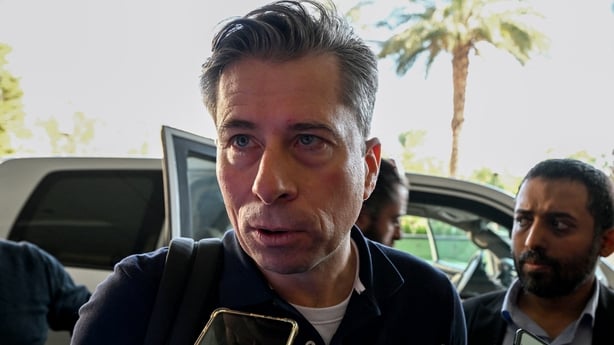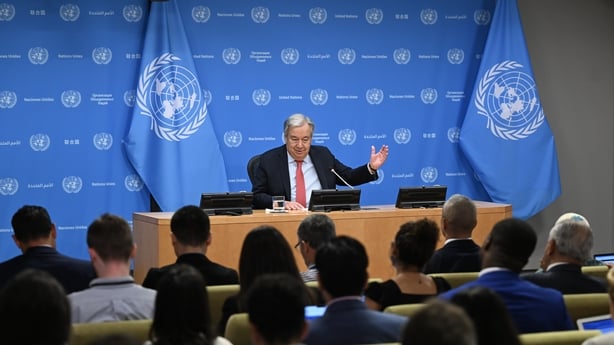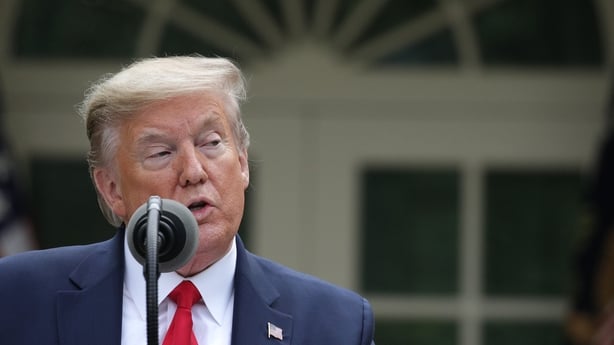Looking around UN headquarters over the past year, faces were glum and spirits were low.
Even the most casual observer could see that this multilateral institution, responsible for keeping global peace and security, was not doing well on either front.
To make matters worse, global hunger and poverty levels rose, while progress on gender equality in many parts of the world went in reverse.
2024 was the year, after all, where women’s rights in Afghanistan were reduced to fewer than those of “a squirrel”, in the words of the actor Meryl Streep, delivered at a UN event in September.
“It has been a catastrophic year for the people we serve,” wrote the UN’s newly appointed aid chief Tom Fletcher in his first humanitarian report earlier this month, adding the startling statistic that 400 million children are currently either living or fleeing conflict zones.
It was also the deadliest year on record for UN humanitarian workers. More that 280 have been killed to date – most of them in Gaza.
As the grim assessments poured in, many diplomats blamed the world’s most powerful countries for acting with impunity, thus undermining the “rules-based international order” – that’s the one set up in the ashes of World War II, to avoid the very situation the world finds itself in today.
The UN’s big powers – the United States, Russia, China, UK and France – certainly spent a lot of the past year sitting around the UN Security Council’s horseshoe table in surly disagreement, rendering the UN’s most senior decision-making body unable to, well, make decisions.
The liberal use of vetoes by Russia, the US and to a lesser extent, China, had much of the rest of UN membership wringing their hands.
“Russia and the US sometimes seemed to be competing to see which could cast the most unpopular vetoes,” said Richard Gowan, UN director at the Crisis Group, a New York-based think tank.
In 2024, Russia unilaterally vetoed resolutions on North Korean sanctions, protection of civilians in Sudan, arms proliferation in outer space and, along with China, a US-penned resolution on an Israel-Hamas ceasefire.
The United States, meanwhile, blocked two votes on a ceasefire for Gaza this year and another on Palestinian membership of the UN.
France and the UK have not used their vetoes since 1989.
As accusations of “hypocrisy” and “double standards” flew around the chamber especially during debates on Ukraine and Gaza, frustration rose for the smaller countries – ten of whom are elected to sit alongside the permanent members on a rotating basis and who eagerly join the council in the hope of getting things done.
As the year dragged on, enthusiasm turned to despondency.
It had not been pleasant to observe these “big, rough powers,” in action, said one senior Security Council diplomat, who declined to be named.
“Diplomats in Turtle Bay [the New York district of UN headquarters] seemed world weary and uncertain whether the UN can escape its current malaise,” Mr Gowan said.
And what about the superpowers themselves?
“I think senior P5 [the five permanent members of the Security Council] diplomats in New York know that their credibility is thin, and they wish that they could turn that around,” Mr Gowan said.
“But the White House has been persistently dismissive of the UN over Gaza, just as the Kremlin doesn’t worry too much about the reputational damage of using its veto in the Security Council,” he added.

Perceptions of hypocrisy are certainly undermining the UN system, analysts said, but go beyond the major powers.
“Double standards know no borders,” Louis Charbonneau, UN director at Human Rights Watch, told RTÉ News at a briefing in October.
Some countries denounce Russian atrocities in Ukraine but stay silent on Israel’s actions in Gaza. Conversely, other member states do support the UN’s accountability measures – such as the International Criminal Court – on Israel and Palestine-related issues, but not on Russia and Ukraine.
“Another example is the OIC (Organisation of Islamic Cooperation) which has rightly championed the rights of Rohingya Muslims in Myanmar and taken a stand against Islamophobia in many western countries but has failed to bring attention to the plight of Uyghurs and other Turkic Muslims in relation to China,” said John Fisher, Deputy Director of Advocacy, Human Rights Watch.
A report by the former UN High Commissioner for Human Rights, published in 2022, found China responsible for “serious human rights violations,” against the Uyghur and other minority population, in the western Chinese province of Xinjiang, that may constitute “crimes against humanity”.
Beijing dismissed the report as “a farce”.
For the UN to work as it should all countries need to be held to the same standards of accountability, Mr Charbonneau said.
“Otherwise, it just looks like accountability is not something that countries believe in, but something that they want to instrumentalise only for foes, not for friends,” he added.
But it’s up to the UN senior leadership to enforce the rules, experts said.
The Secretary General must act like a referee at a football match, Zeid Bin Ra’ad, former UN High Commissioner for Human Rights told RTÉ News in an interview at the International Peace Institute in June of this year.
“If the whistle is not blown consistently, but intermittently, then the tensions start to go up and the players start to foul,” he said.
“Some players try to intimidate the referee into not blowing the whistle, and the game just begins to degrade,” he said, “and I think that’s basically what’s happening.”
Member states will always look after their own national interests, he said, so it is up to the independent bodies within the UN to maintain “moral clarity”.
It is not consistent, he said, to make “a statement in respect of a small country but where a large country, for example China, is concerned, you don’t say anything”.
“Either the rules apply to everyone, or they don’t apply,” he added.

In response, a spokesperson for UN Secretary General António Guterres said: “The Secretary-General has been very clear that the Universal Declaration of Human Rights applies to everyone, everywhere without exception.
“His discussions with Chinese officials have consistently focused on cooperation in all pillars of our work – peace and security, sustainable development and human rights,” the spokesperson added.
But how much influence does the UN chief actually wield?
Not very much, according to Mr Guterres himself.
In an interview with CNN in September, he said that the Secretary General of the United Nations had “no power, and there’s no money”.
“What we have is a voice,” Mr Guterres continued, “and that voice can be loud, and I have the obligation to make it be loud”.
Speaking ahead of the UN’s annual jamboree, the UN General Assembly or UNGA, Mr Guterres articulated his own exasperation with the stymied multilateral system.
“We have a level of division among superpowers than has no precedent since the Second World War,” he told the television network.
“Even in the Cold War, things were more predictable than they are today”, he added.
Across the 193-nation membership, scepticism of the very relevance of the United Nations grew in 2024.
“In private, many ambassadors admit that they struggle to persuade their political masters in their capitals that the UN matters,” Richard Gowan of the Crisis Group said.
There was one moment this year, though, that gave UN officials a modicum of hope and that was September’s Summit of the Future – a major meeting aimed at UN reform.
Despite the malaise gripping most UN proceedings these days, UN insiders were buoyed by the fact that member states showed up – and signed up in big numbers – for the “Pact for the Future”, indicating a strong willingness, in theory at least, to make the United Nations work better going forward.
“2024 showed us both that member states want the UN to help them address today’s most pressing challenges, and that the UN system, as it is now, isn’t fit for the purpose,” Anjali Dayal, associate professor of International Politics at Fordham University in New York said.
“Member states want it to persist and evolve to face contemporary challenges with adequate funding, resources, and reforms,” she added.
Reforming the Security Council was right at the top of the summit’s agenda – which was most definitely a draw for smaller nations who’ve simply had enough of superpower deadlock.

But any major change in the power balance in this nearly 80-year-old institution will not happen quickly. And for UN officials, there’s a more immediate concern: the spectre of a second Trump administration.
He could pull the US out of major UN deals – like the Paris Climate Agreement – and slash funding for the already cash-strapped body. The US funds nearly 25% of the UN’s overall budget.
Will Donald Trump gut the United Nations?
“Come January, the UN’s work worldwide is going to be quite vulnerable to big shifts in US policy, and it may have fewer natural allies within the administration to help mitigate the fallout from these shifts,” said Ms Dayal.
So as the UN’s annus horribilis draws to a close, there is little expectation that 2025 will bring any reprieve.
